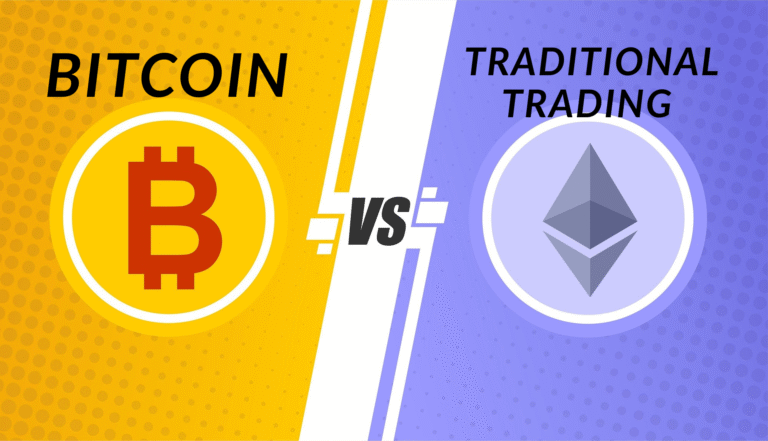Bitcoin vs. Traditional Trading: The emergence of Bitcoin has completely transformed the financial landscape by providing a digital and decentralized alternative to conventional trading techniques. Global finance has historically been based on established markets, such as equities, bonds, and commodities; however, Bitcoin offers a new, volatile, and highly accessible trading environment.
Both trading strategies have different risks and special benefits. Investors navigating today’s volatile markets must comprehend how Bitcoin differs from traditional trading. This comparison examines the differences between these two worlds and their implications for contemporary traders and investors, encompassing aspects such as market hours, regulation, volatility, and technology.
Bitcoin vs Traditional Trading: Key Differences Investors Should Know

The rise of cryptocurrencies, particularly Bitcoin, has significantly changed the financial landscape in the past ten years. Global markets are still dominated by traditional trading, but digital assets like Bitcoin have made a significant niche for themselves. Navigating the changing financial landscape requires that traders, investors, and institutions alike comprehend the distinctions between Bitcoin and conventional trading.
This article examines the main differences, advantages, dangers, and tactical factors that set Bitcoin trading apart from more conventional trading methods like equities, bonds, and commodities.
Crypto vs Stocks: Which Market Offers Better Returns in 2025?
What is Bitcoin Trading?
Bitcoin vs Traditional Trading: Buying and selling Bitcoin (BTC) on cryptocurrency exchanges in an attempt to profit from price swings is known as bitcoin trading. Trading is typically short-term and frequently leverages price swings over hours, days, or weeks, in contrast to long-term holding.
Bitcoin is traded around-the-clock on international platforms using a variety of trading tactics, including algorithmic trading, swing trading, scalping, and day trading.
What is Traditional Trading?
Purchasing and selling assets such as stocks, bonds, exchange-traded funds (ETFs), commodities, or currencies on regulated financial markets like the New York Stock Exchange (NYSE) or NASDAQ is referred to as traditional trading. Government agencies like the Securities and Exchange Commission (SEC) in the United States strictly oversee these markets, which typically operate during designated business hours.
(2) Market Hours & Accessibility.
Bitcoin Trading.
- Availability around-the-clock: Since Bitcoin markets are open 24/7, trading is possible on weekends and holidays.
- Global accessibility: Anyone with an internet connection can access Bitcoin exchanges.
Traditional Trading.
- Limited hours: Most traditional markets are open only during business hours (e.g., 9:30 AM to 4:00 PM EST).
- Regional restrictions: Trading is often restricted by national borders and time zones.
Verdict: Bitcoin offers greater accessibility and flexibility due to its non-stop, borderless nature.
(3) Regulation and Oversight.
Bitcoin Trading.
- Light or evolving regulation: Regulation varies by country, with some embracing crypto and others banning or restricting it.
- Lack of consumer protections: Funds are generally not insured, and fraud or scams are common concerns.
Traditional Trading.
- Heavily regulated: Government bodies oversee traditional markets to ensure transparency and investor protection.
- Investor safeguards: Accounts are often insured (e.g., through SIPC in the U.S.).
Verdict: Traditional trading offers more safety and investor protection, while Bitcoin remains riskier due to regulatory uncertainty.
(4) Volatility and Risk.
Bitcoin Trading.
- Highly volatile: Daily price swings of 5–10% are not uncommon.
- Driven by sentiment and news: Tweets, regulations, or even rumors can move markets dramatically.
Traditional Trading.
- Relatively stable: Blue-chip stocks, bonds, and commodities have lower volatility.
- Backed by fundamentals: Prices are influenced by financial reports, economic data, and earnings.
Verdict: Bitcoin trading offers high reward potential but comes with extreme volatility, making it riskier.
(5) Liquidity and Market Depth.
Bitcoin Trading.
- High liquidity on major exchanges: Platforms like Coinbase offer deep markets for BTC.
- Lower liquidity for smaller coins: Altcoins may have thin order books and large bid-ask spreads.
Traditional Trading.
- Extensive liquidity for major assets: Stocks like Apple, Amazon, and ETFs enjoy tight spreads and high trade volumes.
- Highly institutionalized: The majority of trades are executed by large institutions.
Verdict: Both markets can offer liquidity, but traditional markets are more established and consistent across asset classes.
(6) Trading Tools and Technology.

Bitcoin Trading.
- Advanced trading interfaces: Exchanges offer margin trading, derivatives (e.g., BTC futures), and bots.
- On-chain analysis: Traders use blockchain data (e.g., wallet activity, miner behavior) for strategy.
Traditional Trading.
- Robust tools backed by decades of data: Platforms like Bloomberg Terminal and MetaTrader offer powerful analytics.
- Fundamental and technical analysis: Extensive support for value-based investing and forecasting.
Conclusion: While traditional trading benefits from maturity and institutional-grade resources, Bitcoin trading offers cutting-edge tools and decentralized technology.
(7) Ownership and Custody.
Bitcoin Trading.
- Self-custody possible: Traders can store BTC in personal wallets, outside of exchanges.
- Loss risk: If private keys are lost, money will be lost forever.
Traditional Trading.
- Held by brokers or custodians: Investors rely on financial institutions to hold and manage assets.
- Protected by insurance and regulations: Funds are often safeguarded against fraud or bankruptcy.
Verdict: Bitcoin offers more control, but also more responsibility. Traditional assets are safer from a custody standpoint.
(8) Fees and Costs.
Bitcoin Trading.
- Variable fees: These can include trading, withdrawal, and petrol expenses, among other exchange fees.
- No middlemen: Peer-to-peer transactions can reduce costs.
Traditional Trading.
- Brokerage fees: Depending on the platform, there may be commissions, spreads, and account maintenance fees.
- Mutual funds and exchange-traded funds (ETFs) may have performance or management fees.
Verdict: Both markets can be cost-efficient, but Bitcoin allows for more peer-to-peer transactions that bypass intermediaries.
(9) Tax Implications.
Bitcoin Trading
- Capital gains tax applies: In many jurisdictions, profits from Bitcoin trading are taxable.
- Complex reporting: It might be difficult to keep track of transactions across exchanges and wallets.
Traditional Trading
- Well-defined tax structures: Governments provide clear rules for stock and bond taxes.
- Broker reporting: Many brokers provide tax forms for ease of filing.
Verdict: Traditional markets offer more streamlined and regulated tax reporting compared to crypto.
(10) Future Outlook.
Bitcoin Trading.
- Growing adoption: Institutional investors and countries like El Salvador have embraced Bitcoin.
- Regulatory development: As governments catch up, regulations may add legitimacy and stability.
Traditional Trading.
-
Stable and evolving: Despite being mature, traditional markets are adapting to digital transformations, including tokenization and AI trading.
Conclusion: Traditional markets are still developing and innovating, but Bitcoin is the future of decentralized finance.
Conclusion.
Bitcoin and conventional trading both present special chances, dangers, and experiences. The trader’s objectives, risk tolerance, and interest in cutting-edge technologies all play a significant role in their decision.
| Factor | Bitcoin Trading | Traditional Trading |
|---|---|---|
| Market Hours | 24/7 | Business hours only |
| Regulation | Light / evolving | Heavily regulated |
| Volatility | High | Moderate to low |
| Accessibility | Global / borderless | Often regionally restricted |
| Tools | Cutting-edge / blockchain-based | Institutional-grade |
| Risk Level | High | Lower |
| Ownership | Self-custody possible | Broker-managed |
| Tax Complexity | High | Lower |
| Innovation | Rapid | Steady |
Bitcoin trading is an alluring frontier for traders looking for innovation, high risk/reward, and direct ownership. Traditional trading is still popular among people who value stability, institutional oversight, and established marketplaces.
It is possible that in the future, blockchain technology may be incorporated into conventional banking, and rules will give the cryptocurrency industry structure. For the time being, investors may make more informed, well-rounded choices by comprehending both.

